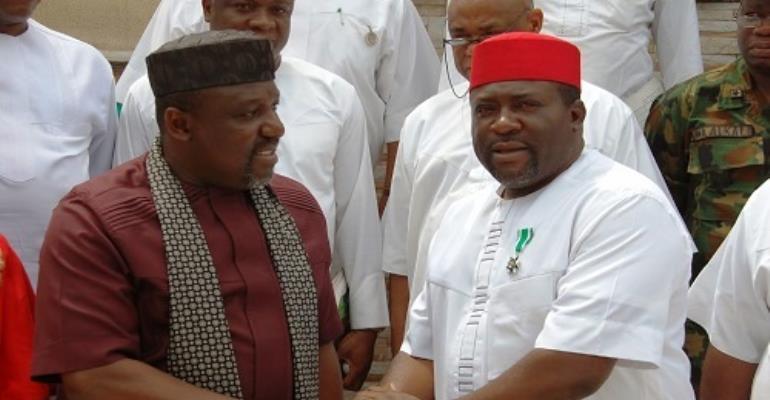The Senate on Friday screened the two newly re-appointed deputy governors of the Central Bank of Nigeria, Aisha Ahmad and Edward Adamu.
The Red Chamber had on Wednesday at plenary commissioned the committee on Banking, Insurance and other Financial Institutions to get clarifications from the apex bank chiefs when they appear for their re-appointment screening.
Reactions have continued to surround the policy of the CBN to limit cash withdrawal for individuals to N100,000 and corporate bodies N500, 000 per week.
The deputy governors however told the committee that it was high time the country embraced the policy.
Saturday PUNCH observed that the senators simply asked for an explanation from the deputy governors without further probing on the details of the policy.
Ahmad, who is the apex bank’s deputy governor on Financial System Stability, explained that the policy was not new as it was introduced in 2012 during former President Goodluck Jonathan’s administration, starting with Lagos State. She said its implementation was extended to Abuja and six more states in 2013.
Ahmad added, “Though full implementation of the policy has not been carried out by CBN since then, its introduction has brought a lot of transformation to the banking and payment systems.
“Based on information available to the CBN, the time for full implementation of the policy with the proposed limit on cash withdrawals per week is now. The required infrastructure for its implementation in terms of financial access point system, mobile money, E-naira, etc, are available across the 774 local government councils in the country.
“All the fears and worries being expressed by Nigerians about the planned limited cash withdrawal policy are seriously being taken care of as nobody or a section of Nigerians will be left out.”
She noted that in the past, transactions were limited to bank branches but has expanded to include multiple electronic platforms as well as a geometrical increase in the number of agents from 88,000 to 1.4 million.
She said the apex bank would be ready to accommodate opinions that wouldn’t make the policy strenuous to any category of Nigerians during implementation.
After her presentation, the committee, chaired by Senator Uba Sani (APC Kaduna Central), asked the nominees to “take a bow and go” as moved by the Whip of the Senate who doubles as the deputy chairman of the committee, Senator Orji Kalu (APC, Abia North) and seconded by Senator Danjuma Goje (APC,Gombe Central).
In a dramatic twist, the ‘take a bow and go’ verdict by the committee chairman didn’t appear to sit well with some senators. A former governor and senator representing Bayelsa West, Seriake Dickson, told journalists after the screening that he wasn’t against the policy but the timing was wrong.
Dickson lamented that he had expected that senators would be allowed to grill the nominees at such a time that the country was going through hardship. He said it was important to examine the readiness of institutions, the economy and small business owners not in the banking system.
He stated, “They should have been grilled in national Interest; we are not here playing and if our country is going through a terrible situation and circumstances and if at this point in time, we have nominees of Mr President who have been managing the economy in such a way that people are not comfortable and we are talking about a screening exercise and people just say, ‘take a bow and go’, then that’s not fair enough.”
He noted that since the current administration would soon end, it was best to leave the policy for the next administration.
He added, “The CBN can introduce the policy, we can debate it, but not to rush the country into this cashless policy when you have a national outcry. I think we need to reexamine this and the Senate committee, of which I’m a part, should have more deliberately questioned the CBN nominees on the policy and the.”
Policy against politicians – Fintiri
Meanwhile, Governor Ahmadu Fintiri of Adamawa State has accused the CBN Governor, Godwin Emefiele, of targeting the political class with the cash withdrawal limit policy.
Fintiri, who was reacting to the new CBN policy during a campaign in Kala’a Hong Local Government Area, said, “What is breeding poverty? Economic policies! Look at the one that is about to be implemented by the Central Bank which would further throw the country into poverty.
“Nobody is saying the economy shouldn’t be cashless. Take time and do it systematically. We shouldn’t do it as if some people wanted to be politicians and they were denied the opportunity, then they use their office to punish the politicians.”
In a related development, an economic expert, Prof Olamilekan Aworinde, says Nigerians and business owners will suffer from the recent cash withdrawal limits which the CBN said would take effect from January 9, 2023.
Aworinde explained that although the policy was a means of controlling the amount of cash in circulation and a cornerstone to launching a cashless system, businesses would be adversely affected across the country.
He added people without android phones would find it difficult to do business because they would not be able to transfer money without such smart phones.




2 Comments